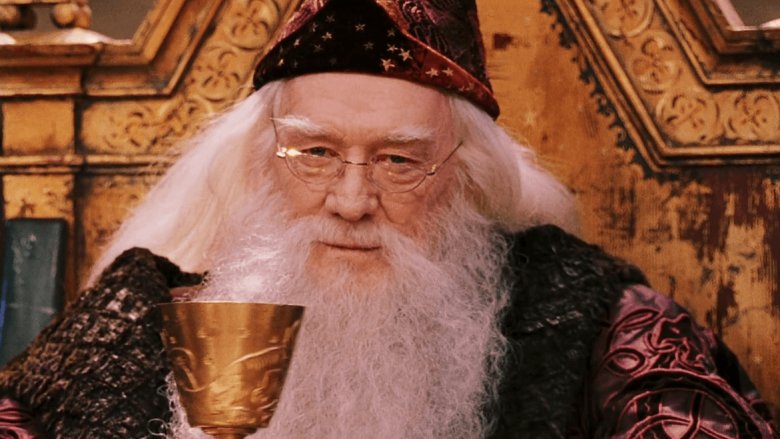This is the one Harry Potter film I’d seen only seen once before — and I must say it is better than I remembered, and proves a spectacular finale to the series. Perhaps David Yates was “saving it up” for the grand finale (taking Hitchcock’s advice that “If you want to scare an audience you must first bore them to death”). Whatever the reasons, Yates acquits himself admirably. This film is “the gift that keeps on giving” — a quintessential example of how to fashion a story (and film) in which every scene trumps the previous one. Admittedly (like Yates’ previous installments) The Deathly Hallows Part II may not be not as visually-arresting as parts I-IV, but as a narrative, it is, propulsive, imaginative, persistently thrilling — and often deeply moving.
Although The Deathly Hallows has a “happy ending”, it is hard-won. Many significant characters we’ve come to know throughout these stories are killed in the final battle against the deatheaters. The actions of Professor Snape — an enigma throughout the previous adventures — are also finally made clear, and his private tragedy revealed.
Apart from Harry, Hermione and Ron, the student supporting characters prove just as interesting as the leads — with distinctive personalities, and given more to do than just look on as the principals exhibit all the heroics. Neville Longbottom arguably has the most interesting character arc, having gone from timid klutz to brave young man — who ultimately plays a vital role in Voldemort’s downfall. The casting of Matthew Lewis as Neville also proved quite serendipitous, as the actor matured over the course of the series from a short, chubby kid to a dashing, handsome fellow — perfectly mirroring the development of character himself.
Helena Bonham-Carter doesn’t get enough credit for her work in this movie. Not only is she searingly convincing as the sadistic, deranged Beltrax Lestrange, she is equally convincing in the role of Hermione Grainger disguised as Belatrix Lestrange (via polyjuice potion), and captures Emma Watson’s mannerisms with detailed perfection. (Hermione’s difficulty walking in Lestrange’s high heels is also a clever and amusing touch.)
However, this is not a perfect film -- owing mostly to Alexandre Desplat’s lackluster score. Desplat's music is a step-up from his work on the previous film (and at times somewhat effective) but it never really “seizes the moment”, and is for the most part simplistic and too subdued. That John Williams was unable to score The Deathly Hallows is the single greatest disappointment to me as a film (and film music) fan ever. Happily, the filmmakers did at least track the final scene with Williams’ “Leaving Hogwarts” — which was the proper thing to do, as it brings the story full-circle, and ends the film on an emotional and musical high (which I doubt Desplat could have delivered). It also acknowledges (whether the filmmakers are aware of it or not) Williams’ important contribution to the series. If John Williams had scored this movie, I might have given it a 10/10.
All the same, I'd say Deathly Hallows Pt. 2 is the strongest single film in the franchise, and delivers a more than satisfying conclusion to the story arc. This is in contrast to most other franchises, which tend to run out of steam toward the end (or come to an end because they’ve run out of steam). The Potter stories consistently surprise and enthrall the audience with new ideas and an engrossing, complex narrative (with wonderfully believable, three-dimensional characters). It is also quite an experience to “binge watch” the series and see these characters — and performers — grow-up before our very eyes (thank Heaven Warner Bros. abandoned their misguided idea of recasting the kids). It is also amazing to consider that in a series of eight films, no major character — other than Professor Dumbledore — had to be re-cast.
Then you have the character of Harry himself — an orphan, and victim of child abuse, who discovers he has magical powers and an extraordinary destiny -- yet he remains humble and altruistic. The fame thrust upon him is unwanted, and he wishes only to have a normal life (to the extent a wizard can at least). He is slandered, at times unfairly treated, he loses his godfather Sirius Black, and his most important mentor, Professor Dumbledore -- but never grows bitter. He is heroic, and forgiving — he even risks his life to save Draco Malfoy, when leaving him to die would not have been unjustified. Harry truly is one of the best role models for young people that literature (and now popular culture) has to offer.
Attempts to imitate / compete with the Harry Potter films — i.e. Narnia, Peter Pan, The Golden Compass, The Spiderwick Chronicles, even the Chris Columbus-helmed Percy Jackson and Rowling’s own Fantastic Beasts efforts -- came-off with mixed results. Harry Potter really is is a unique phenomenon in cinema history, and appears destined, rightly, to take its place among the classics.

“To Harry Potter — the boy who lived.”

